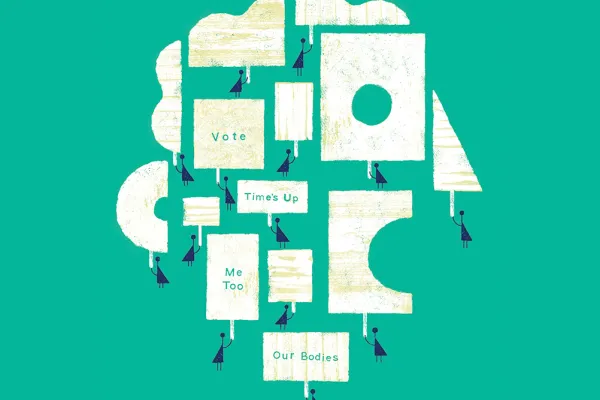‘I Could Walk Out’
Alumnae News

Published March 8, 2018
For years, Tomi-Ann Roberts ’85 pushed down the memory of a summer day in 1984, when a dream turned, in the space of one afternoon, into humiliation and regret. After that day, she rarely spoke of the experience, and then as a kind of party joke. “I would make it be something sort of silly, and I wouldn’t tell the details,” she says. “My way of coping, I guess.”
Her reluctance to talk about that long-ago encounter with film producer Harvey Weinstein ended last fall when The New York Times broke a story about Weinstein’s patterns of sexual harassment and abuse. When Roberts read the accusations by Ashley Judd and others, she realized that Weinstein’s M.O. was all too familiar. In solidarity with the other accusers, she decided to tell her story via email to Jodi Kantor, a Times reporter. Her account became the second in a sickening string of Times stories about Weinstein.
In 1984, Roberts was 20, and considering a career on the stage. At Smith, she had gained notice in an all-female production of The Boyfriend and had been in a TV commercial with the actress Elisabeth Shue. “I moved to New York for the summer, and hoped for auditions and castings,” she wrote in an Oct. 5 email to Kantor at the Times. At the restaurant where she worked, Roberts had met
a pair of brothers, Bob and Harvey Weinstein, who told her they were about to direct their first feature film. Throughout the summer, the Weinsteins sent her scripts via courier. “That was very exciting, as you might imagine,” she says.
Then she got the phone call. Harvey Weinstein was inviting Roberts to his apartment to talk about the movie, she says. She expected to find a room full of film people. Instead, it was only her and a darkened apartment where Weinstein was calling to her from down a long hallway. He was waiting for her in the bathtub.
“I stood there, frozen,” she recounted in the email, which she also sent to her mother and her grown daughters. “He spoke calmly to me, saying he thought that we’d get along a lot better if I was comfortable with his nakedness, and—here was the kicker—that I would give a much better audition if I was comfortable getting naked in front of him. After all, he said, in the movie for which I was auditioning, the character would likely have a topless scene.”
Instead, she fled. Immediately, Roberts knew that she had sabotaged any hope of being cast in Weinstein’s movie. And she wondered why she hadn’t just gone along with it. “The way I reacted back then was to think that I wasn’t cool enough and I wasn’t free enough with my sexuality,” Roberts says now. The event was deeply demoralizing. “Something in me said, ‘What did you expect? You were
reaching for something that is so out of your reach. What a dummy you’ve been.’”
When she returned to Smith that fall, she left behind her acting aspirations and committed herself to psychology, eventually getting a doctorate at Stanford. Now, as a professor at Colorado College, she focuses on the psychological consequences of the sexual objectification of girls and women.
Roberts is sympathetic to women who didn’t flee, who went along to further their dreams. What allowed her to reject Weinstein—and give up her acting dreams—was knowing she had choices. “I had friends back in my apartment. I had a life to walk back into. I had Smith College,” she says. “And I could walk out.”
This story appears in the Spring 2018 issue of the Smith Alumnae Quarterly.
Learn More
Heard and Believed
A cultural recokoning. The #MeToo movement. Time’s up. The catchphrases of the past several months describe a seemingly sudden tectonic social shift in attitudes about sexual harassment—when women’s accusations are being believed and accused men are facing consequences.
Undermined by a Thousand Cuts
Keeping women in their place. That's the net effect of catcalling, harassment and other behaviors that reduce women to their sexuality, say psychology professors Tomi-Ann Roberts ’85 and Lauren Duncan.
An Army at Her Back
Going public with harassment allegations against a beloved movie star takes courage and resolve. It helps to know that your Smith friends on social media will rise up with you.
Illustration by Melinda Beck